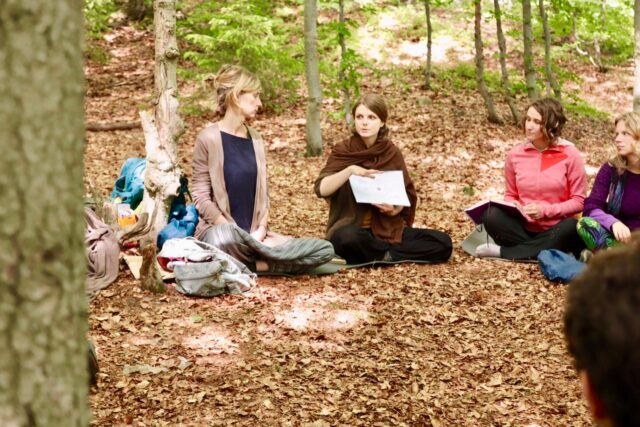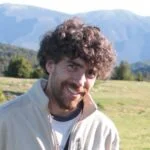How can youth work respond successfully to the climate and environmental crises?
Year of production: 2021
Raising awareness of how serious the situation is may not be enough. In this article you will find some examples of how to help young people engage with the climate cause in new ways.
We have recently been able to read in the media about the severe degradation of the ecosystems and the daily extinction of over 150 species. We can also read that “climate change is widespread, rapid, and intensifying”, according to the latest report of the IPCC. 11,000 scientists warn that unless rapid and ambitious reductions in CO2 are decided at the COP26 summit in Glasgow this November, the world faces “untold suffering”.
Dealing with these headlines is not easy. Even less so if you are young. Logical questions like What can I do? Is it too late? can be very difficult to deal with. The flow of unpromising environmental news is having a significant emotional impact on Europe’s youth. In fact, young Europeans worry more about climate than COVID-19. This often translates into overwhelming feelings of anxiety and fear, which do not help our young generations engage politically or socially.
Environmental education and media tend to focus solely on promoting recycling, reducing one’s ecological footprint or sharing raw facts that are difficult to digest. While essential, this approach falls short of addressing the emotional implications of the current environmental crisis.

Being aware of this, some youth workers believe that new challenges require new approaches. The people interviewed here are active in the Erasmus+ programme. I chose them because they are already developing and applying new ways to address climate in a way that helps young people deal with these emotions. And by doing so, youngsters find it easier to actively engage and become makers of the changes they want to see.
Rights. Sara Marzo. Original photo
Listen 1 min. audio clip
“LET’S HELP YOUNG PEOPLE DEVELOP ECOLOGICAL COMPETENCE” – Sara Marzo
Based in Lecce (Italy), Sara Marzo has worked for the last 10 years on designing European youth projects on climate change and the environment. Five years ago, she also became a climate activist.
Youthpass, the European certificate that recognises youth work activities, is the starting point of our conversation. She misses a “key competence” in it: the ecological one, which would evaluate the knowledge, skills and attitudes in relation to the natural world.
She asserts that young people “have little knowledge about the climate crisis and they don’t know where to find official reliable data”. As for skills, she finds that they need to “develop concrete abilities or habits, such as self-production, biking or walking, buying with awareness, reducing, reusing, repairing, recycling, upcycling. With regard to attitudes, she notices “a remarkable disconnection between them and nature and a sense of overwhelming. Despite this I observed curiosity as well as a willingness to learn and engage, especially when guided.”
So, what can be done? Sara reflects and says: “as youth workers we can play a significant role in developing this ‘ecological competence’. We must inspire and empower the new generations, placing them in a good place to act, to become protagonists of their lives so that they can feel like they can make a difference in the world”. More concretely, she mentions the need to “adopt new tools that approach and combine different elements such as ecology, mindfulness, eco-centric education, climate justice, etc.”
She ends with: “I can say nature-based activities and mindfulness exercises outdoors can indeed create a deep emotional experience of interconnectedness, attuning emotions with nature, to calm and self-regulate the emotional system through mindfulness and embodiment. I can particularly recommend the methodology “The Work That Reconnects” by Joanna Macy.”
Rights: Adrià Sonet. Original photo
“WE SHOULD CREATE MORE EMPATHETIC SPACES WHERE WE CAN ADDRESS THE DIFFICULT EMOTIONS RELATED TO CLIMATE CHANGE” – Adrià Sonet
Adrià Sonet, based in Barcelona, is a committed youth worker with extensive experience in body expression, gamification and nature-based methods. I have personally witnessed how good he is at creating safe spaces where emotions can be expressed.
We both agree that the new generations are the ones who will mostly suffer the consequences of climate change. So how can youth work help them to take action?
Adrià explains: “Youth work and Erasmus+ in general provide great opportunities to approach topics in ways impossible for formal education or mass media. As youth workers we can and should create more empathetic, human spaces where we can address the difficult (not necessarily negative) emotions that come with the ecological degradation of our planet.”
So, I ask him what methods he uses: “Theatre of the oppressed, body movement, game-based learning, gestalt exercises… These tools can facilitate personal growth, connecting with others and taking responsibility with regard to social and ecological issues.”
And does it work?: “It’s difficult to measure results objectively but I believe that If we help youngsters to connect with their bodies and emotions, they will better cope with all these ecological issues and we will see amazing results.”
Sandra at work. Rights: Actions for Change. Original photo
“I INVITE YOUNG PEOPLE TO DISCOVER THEMSELVES AS CREATURES OF THE WORLD” – Sandra Horea
Sandra Horea is based in Romania. She has over 12 years’ experience as a youth worker and now she is a “nature-based human development guide”. She was trained at Animas Valley Institute in the USA.
So, I directly ask Sandra, how can youth work respond to the climate challenge?
“The environmental and humanitarian crises are connected to an existential crisis. We need to understand how we got into this mess in the first place. I believe that if we are able to answer the question, Who am I? What are the gifts I can offer to the world? We will be in a much better position to address these issues.”
“My goal is for the youth to be inspired by the beauty, mystery, and richness of nature, so that they can act from a place of awareness and maturity, using their own resources, gifts and creativity. And this is exactly what the world needs today; a huge, creative and immediate effort of every one of us to avoid the worst consequences of climate change.”
So, what should we do? “I usually invite participants to go into nature with some questions about the natural world, themselves and their personal relationship with it. I find it a great way to connect with the natural world and be able to fully appreciate it. What we love we don’t neglect. I am glad to see many participants of my workshops engaging to make a better world.”
Carmine probably telling a story. Rights: C. Rodi. Original photo
“TO SAVE THE WORLD WHAT WE NEED IS NEW STORIES” – Carmine Rodi
Carmine Rodi is a Neapolitan trainer and author based in Prague, who specialises in experiential activities, storytelling and educational games.
According to Carmine, “we all have stories to tell, we just need to learn how to express them. I’d like to see storytelling not just as a consumer product – like Netflix – but as a tool we have available to provide meaning and to make our lives fuller and richer.”
So, how can stories help? He replies: “The current situation is critical and can be really depressing. For example, I just read that the stream that keeps Europe warm is at risk. But whatever mess we are in, we all need motivation to face it. And this cannot be done without stories that offer a map of where we want to go. And these new stories should be crafted by the young people themselves. It’s about moving from just consuming mass-media stories to creating new ones that make sense to us, that empower us, and that inspire us. We can’t let young people believe that it’s too late or that there is nothing they can do! The notion that we can take action and save the world is an ancient narrative, but it needs to be put into a more modern light. There is work to be done!”





